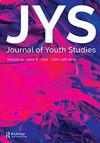A political economy of youth policy in Mexico
IF 2.2
3区 社会学
Q1 SOCIAL SCIENCES, INTERDISCIPLINARY
引用次数: 0
Abstract
This article discusses the recent adoption of a large-scale youth programme in Mexico. Political economy approaches offer a critical account of the institutional arrangements that have resulted in the emergence of specific educational, labour and, more recently, youth policies in the Latin American region. Studies of youth policies are still developing and are a multidisciplinary field. This article draws on various theoretical traditions from various fields, constituting a novel approach to studying these policies. This article combines empirical evidence drawn from interviews with policy stakeholders with the analysis of key policy documents. It employs a Cultural Political Economy (CPE) approach to explain the Mexican government’s adoption of the youth programme Jóvenes Construyendo el Futuro’ (JCF) in 2018, which provides paid on-the-job training to 2.3 million young people aged 18–29. The JCF’s adoption resulted from the rising to power of a left-wing political coalition presenting an anti-neoliberal alternative based on explicit notions of social justice and inclusion with a national development plan reminiscent of an inward-oriented development paradigm aimed at strengthening the internal market, reminiscent of recent ‘neo-developmentalist’ projects in the region. JCF represents a notorious case study of the political economy of youth policy in Mexico.墨西哥青年政策的政治经济学
本文讨论了墨西哥最近通过的一项大规模青年方案。政治经济学方法对导致拉丁美洲区域出现具体的教育、劳工和最近的青年政策的体制安排提供了批判性的说明。青年政策研究仍在发展中,是一个多学科领域。本文借鉴了不同领域的理论传统,为研究这些政策提供了新的思路。本文结合了从政策利益相关者访谈中获得的经验证据和对关键政策文件的分析。它采用文化政治经济学(CPE)的方法来解释墨西哥政府在2018年采用青年计划Jóvenes construcyendo el Futuro ' (JCF),该计划为230万18-29岁的年轻人提供有偿在职培训。JCF的采用源于左翼政治联盟的崛起,该联盟提出了一种基于明确的社会正义和包容概念的反新自由主义替代方案,其国家发展计划让人想起旨在加强内部市场的内向发展范式,让人想起该地区最近的“新发展主义”项目。JCF代表了墨西哥青年政策的政治经济学的一个臭名昭著的案例研究。
本文章由计算机程序翻译,如有差异,请以英文原文为准。
求助全文
约1分钟内获得全文
求助全文
来源期刊

Journal of Youth Studies
SOCIAL SCIENCES, INTERDISCIPLINARY-
CiteScore
5.00
自引率
10.50%
发文量
82
期刊介绍:
Journal of Youth Studies is an international scholarly journal devoted to a theoretical and empirical understanding of young people"s experiences and life contexts. Over the last decade, changing socio-economic circumstances have had important implications for young people: new opportunities have been created, but the risks of marginalisation and exclusion have also become significant. This is the background against which Journal of Youth Studies has been launched, with the aim of becoming the key multidisciplinary journal for academics with interests relating to youth and adolescence.
 求助内容:
求助内容: 应助结果提醒方式:
应助结果提醒方式:


